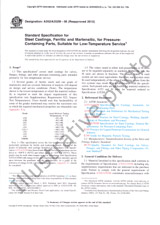We need your consent to use the individual data so that you can see information about your interests, among other things. Click "OK" to give your consent.
ASTM D3928-00a(2018)
Standard Test Method for Evaluation of Gloss or Sheen Uniformity (Includes all amendments and changes 6/20/2018).
Translate name
STANDARD published on 1.6.2018
The information about the standard:
Designation standards: ASTM D3928-00a(2018)
Publication date standards: 1.6.2018
SKU: NS-851185
The number of pages: 3
Approximate weight : 9 g (0.02 lbs)
Country: American technical standard
Category: Technical standards ASTM
The category - similar standards:
Annotation of standard text ASTM D3928-00a(2018) :
Keywords:
gloss uniformity, sheen uniformity, touch-up,, ICS Number Code 87.040 (Paints and varnishes)
Additional information
| Significance and Use |
|
3.1 When coatings are applied to large flat surfaces such as walls, the film thickness may vary or there may be small areas missed entirely (holidays) when the color of the fresh material and the previous film are very similar. It is much less costly if these areas can be touched up instead of having to repaint the entire surface. 3.2 Thickness is also affected in the locations where an area coated a short time before is joined with the area currently being coated (laps). An application technique that may affect the final appearance of the film is brushing or rolling the material in different directions in adjacent areas. 3.3 Both buyers and sellers are interested in determining whether a coating can be applied without exhibiting areas that differ in appearance because of laps and brush or roller marks, and whether it can be readily touched up to provide a uniform appearance in regard to gloss or sheen and all other aspects. |
| 1. Scope |
|
1.1 This test method covers the determination of the uniformity of gloss or sheen of a paint applied by brush to a test panel simulating an interior wall section. Variations in gloss or sheen that may be caused by short wet edge time, poor leveling, and pigment orientation or flotation during and after application are evaluated visually. 1.2 Because both the application and the panel evaluation are very subjective, this test method should be used only for comparative testing within one laboratory as the ratings assigned by different laboratories do not usually agree (see 8.1). 1.3 The values given in SI units are to be regarded as the standard. The values given in parentheses are for information only. 1.4 This standard does not purport to address all of the safety concerns, if any, associated with its use. It is the responsibility of the user of this standard to establish appropriate safety, health, and environmental practices and determine the applicability of regulatory limitations prior to use. 1.5 This international standard was developed in accordance with internationally recognized principles on standardization established in the Decision on Principles for the Development of International Standards, Guides and Recommendations issued by the World Trade Organization Technical Barriers to Trade (TBT) Committee. |
We recommend:
Technical standards updating
Do you want to make sure you use only the valid technical standards?
We can offer you a solution which will provide you a monthly overview concerning the updating of standards which you use.
Would you like to know more? Look at this page.




 Cookies
Cookies
